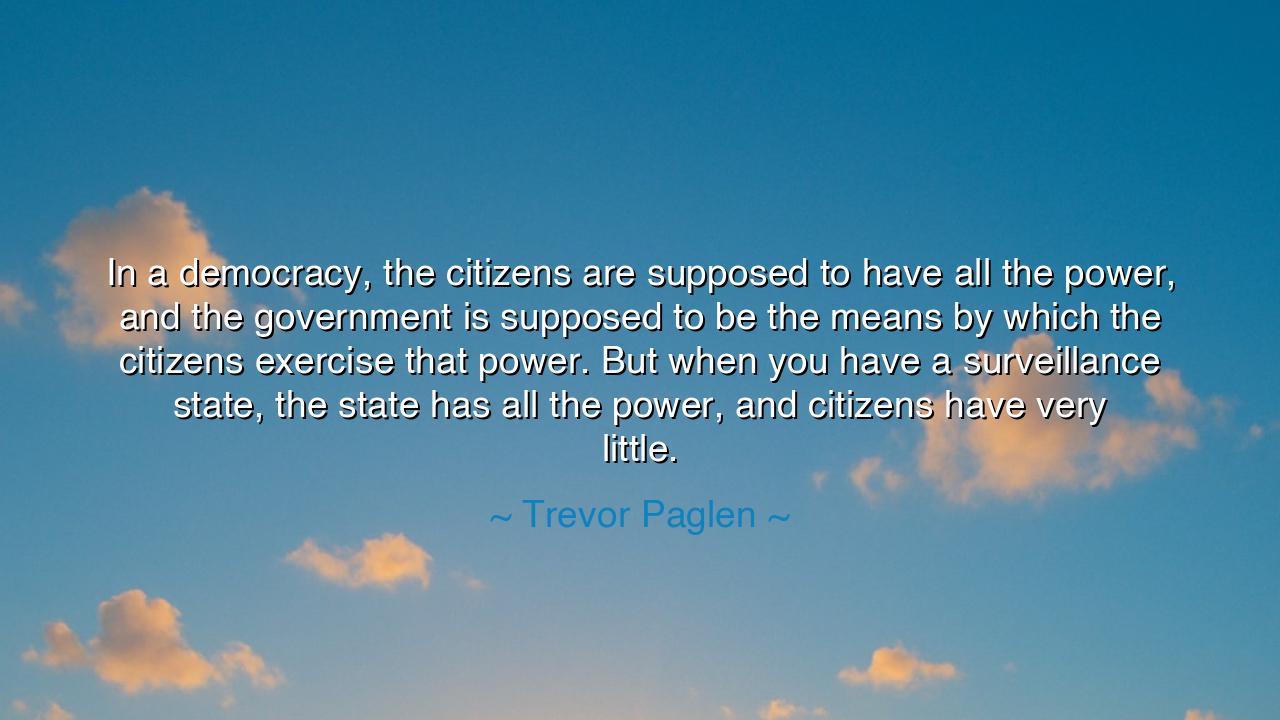
In a democracy, the citizens are supposed to have all the power
In a democracy, the citizens are supposed to have all the power, and the government is supposed to be the means by which the citizens exercise that power. But when you have a surveillance state, the state has all the power, and citizens have very little.






The words of Trevor Paglen rise like a warning bell in the night: “In a democracy, the citizens are supposed to have all the power, and the government is supposed to be the means by which the citizens exercise that power. But when you have a surveillance state, the state has all the power, and citizens have very little.” These words, though born in the modern age of machines and invisible eyes, carry the ancient weight of truth about freedom, power, and trust. For in every age, from the empires of kings to the republics of men, there has been one eternal struggle—the battle between those who are governed and those who govern, between the watcher and the watched.
Paglen, an artist and thinker of the modern world, speaks not of the sword or the chain, but of the digital gaze—the unseen eye that watches without sleep, that records without mercy, that knows what no ruler of old could ever know. He warns that when the tools of government, meant to serve the people, turn inward to spy upon them, the sacred balance of democracy is broken. The people, once sovereign, become subjects once more, not through conquest, but through surveillance. For a people who are always watched can no longer be truly free. Their thoughts grow cautious, their voices measured, their courage dimmed. And in that silence, the spirit of liberty withers.
The ancients knew this truth well, though their instruments were crude compared to ours. In the Roman Republic, before Caesar took the crown, the senators warned against any man who held too much knowledge or command over the citizens. They understood that power without oversight breeds tyranny, even if born in noble purpose. And so they built their systems of checks, their tribunes and laws—to guard against the corruption of power. Yet when fear and ambition outweighed vigilance, the republic fell, and Rome bowed to the emperor’s will. Thus, surveillance may take many forms—not always through machines, but through the loss of watchfulness in the hearts of free men.
We see the same story unfold in more recent times. In the 20th century, vast empires rose under the banners of security and order, promising peace through control. But the people of East Germany lived under the eye of the Stasi, where every neighbor might be an informant, every word a weapon. The government knew everything—except how to trust its citizens. It fell, as all such powers do, not through invasion, but through the quiet rebellion of those who refused to live without dignity. For no wall, no wire, no secret police can long imprison the human soul once it remembers that freedom is its birthright.
Paglen’s warning is thus a torch passed to our generation. He speaks not only of governments, but of ourselves—of the temptation to trade freedom for safety, privacy for convenience. Each time we surrender a little of our power to those who promise to protect us, we move closer to the edge where democracy ends and domination begins. For the strength of a democracy lies not in the might of its institutions, but in the vigilance of its people. The moment the people cease to watch their government, the watchers become the masters, and the masters, the tyrants.
Let this truth be etched upon the hearts of all who love liberty: freedom requires obscurity. The right to think, to speak, to err, and to dream beyond the reach of power is sacred. When the state sees all, man becomes less than human—he becomes predictable, manageable, tamed. The flame of individuality is dimmed beneath the cold gaze of total visibility. It is not darkness we should fear, but a world with no shadows at all.
Therefore, my children of the future, guard your privacy as you would guard your soul. Question those who claim to protect you by knowing everything about you. Demand transparency from power, but grant it sparingly to authority. Let the citizens remain the rulers, and the government remain the servant. And when you build the machines of tomorrow, build them not as eyes that enslave, but as tools that enlighten. For a democracy without privacy is no democracy at all—it is a gilded cage.
Remember this above all: the true strength of a free people lies not in their wealth, nor their armies, nor their technologies, but in their courage to say, “You shall not watch me without my consent.” For when a people keep their right to be unseen, they preserve the light of freedom itself—a light that no surveillance, however vast, can ever truly extinguish.






AAdministratorAdministrator
Welcome, honored guests. Please leave a comment, we will respond soon